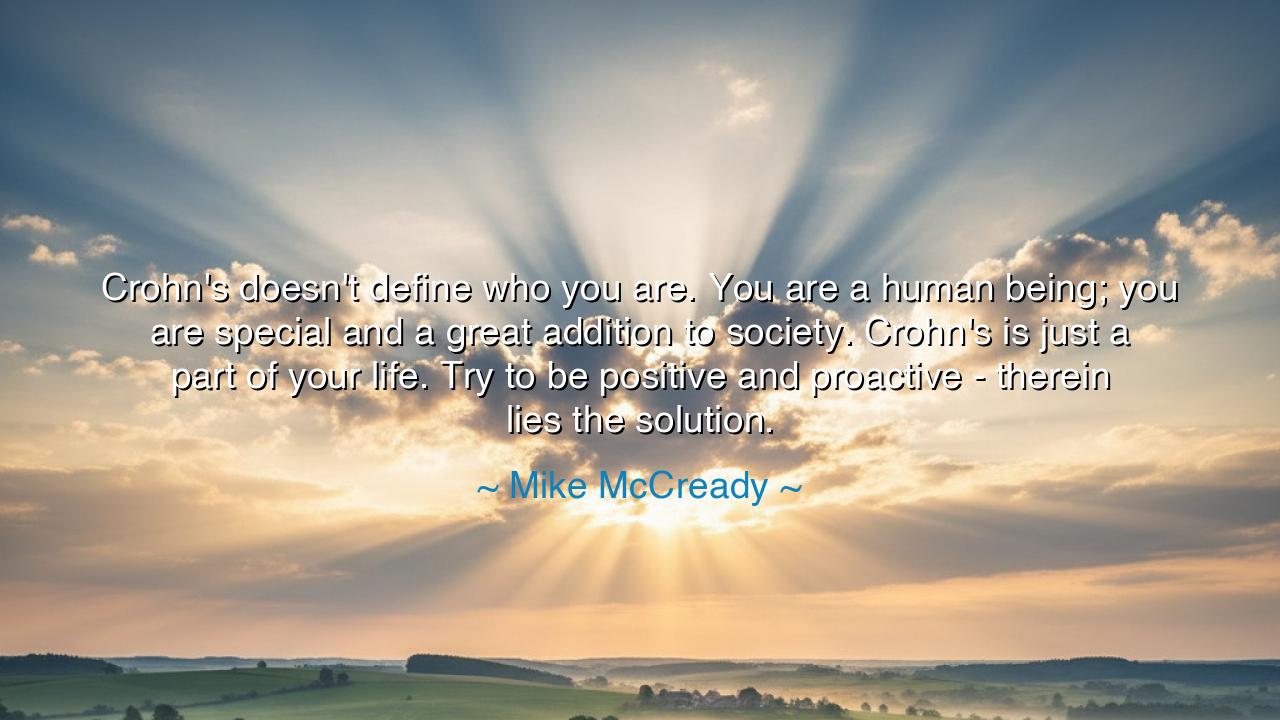
Crohn's doesn't define who you are. You are a human being; you
Crohn's doesn't define who you are. You are a human being; you are special and a great addition to society. Crohn's is just a part of your life. Try to be positive and proactive - therein lies the solution.






The words of Mike McCready, “Crohn’s doesn’t define who you are. You are a human being; you are special and a great addition to society. Crohn’s is just a part of your life. Try to be positive and proactive—therein lies the solution,” resound like the counsel of a sage who has wrestled with suffering and found strength. They teach us that illness, though heavy, is not the sum of the soul. The body may falter, but the spirit remains unbroken, and the measure of a life is not its affliction but the dignity with which it is lived.
The origin of such wisdom springs from McCready’s own battle with Crohn’s disease, a chronic condition that tests the endurance of those who bear it. Yet from struggle arises insight: he saw that despair chains the spirit more tightly than the illness itself, while hope and action loosen its grip. To declare that Crohn’s does not define a person is to strike at the root of stigma and self-doubt, affirming that identity is greater than suffering, and worth is untouched by weakness.
Consider the story of Franklin D. Roosevelt, stricken with polio and confined to a wheelchair. Though many sought to define him by his condition, he refused to be reduced to it. Instead, he became one of the most influential presidents of the United States, guiding a nation through depression and war. His triumphs, like McCready’s words, proclaim that the human spirit is not defined by affliction but by its response to it—by remaining positive, proactive, and committed to contributing to the greater society.
McCready’s counsel is also a call to perspective. To recognize oneself as special is not vanity but survival; it is the conscious act of affirming life’s value when hardship tempts despair. By reminding the afflicted that they remain “a great addition to society,” he lifts them from isolation into belonging, affirming that even in suffering, their lives enrich the world.
The message is heroic, though humble: the path to strength is not the denial of pain, but its integration. Crohn’s is “just a part of your life,” not its whole. To accept this is to disarm the illness of its power to define. To meet it with courage, to act with resilience, and to keep faith in one’s worth—this is the solution McCready sets before us.
Let future generations hold this wisdom close: affliction may visit, but it does not conquer. Whether one faces Crohn’s or any other burden, remember always that the soul is larger than the suffering, and that a positive heart and a proactive spirit can turn even hardship into a source of strength. For in every struggle lies the chance to prove that humanity’s greatness is not in perfection, but in perseverance.






CTChibi Tien
Mike McCready's quote is a powerful reminder to not let illness take over your identity. While Crohn’s is just a part of someone’s life, living with it day-to-day can be exhausting. How can we encourage people to adopt a positive outlook without minimizing the difficulties they face? What can be done to ensure that living with a chronic illness is not only about staying positive but also about receiving the proper care, understanding, and empathy from others?
ANDuc Anh Nguyen
I appreciate how McCready emphasizes that Crohn's disease doesn’t define a person, but how realistic is this for everyone? Living with chronic illness can certainly bring a sense of identity challenge. What about the days when the illness is too overwhelming to stay positive? Is it fair to expect someone to always be proactive, especially when there are days when managing a condition feels like a full-time job? How can we offer space for both strength and vulnerability?
HLnguyen hai lam
Mike McCready’s words are empowering for anyone living with a chronic condition like Crohn’s. The idea of being ‘proactive’ and focusing on the positive gives people a sense of control over their lives. However, does this perspective sometimes overlook the emotional and physical realities that come with chronic illnesses? Can we truly be proactive every day, or is it okay to have moments of vulnerability and frustration without feeling like we’re failing?
KNKim Ngan
This quote really highlights the importance of not letting chronic illness dictate your identity. It’s empowering to think of Crohn's as 'just a part of your life,' rather than the central focus. But how realistic is it to always stay positive and proactive? Does society expect too much from people with chronic illnesses in terms of being upbeat and strong all the time? How can we provide better emotional support for those facing daily struggles?
GDGold D.dragon
Mike McCready’s quote is incredibly uplifting and offers a positive perspective on living with Crohn's disease. It’s a reminder that while chronic illnesses like Crohn's can be challenging, they don't define us. We are more than our conditions. However, I wonder if always maintaining a positive attitude can sometimes feel overwhelming, especially on difficult days. How can we balance staying positive with acknowledging the emotional toll chronic illness can take on a person?